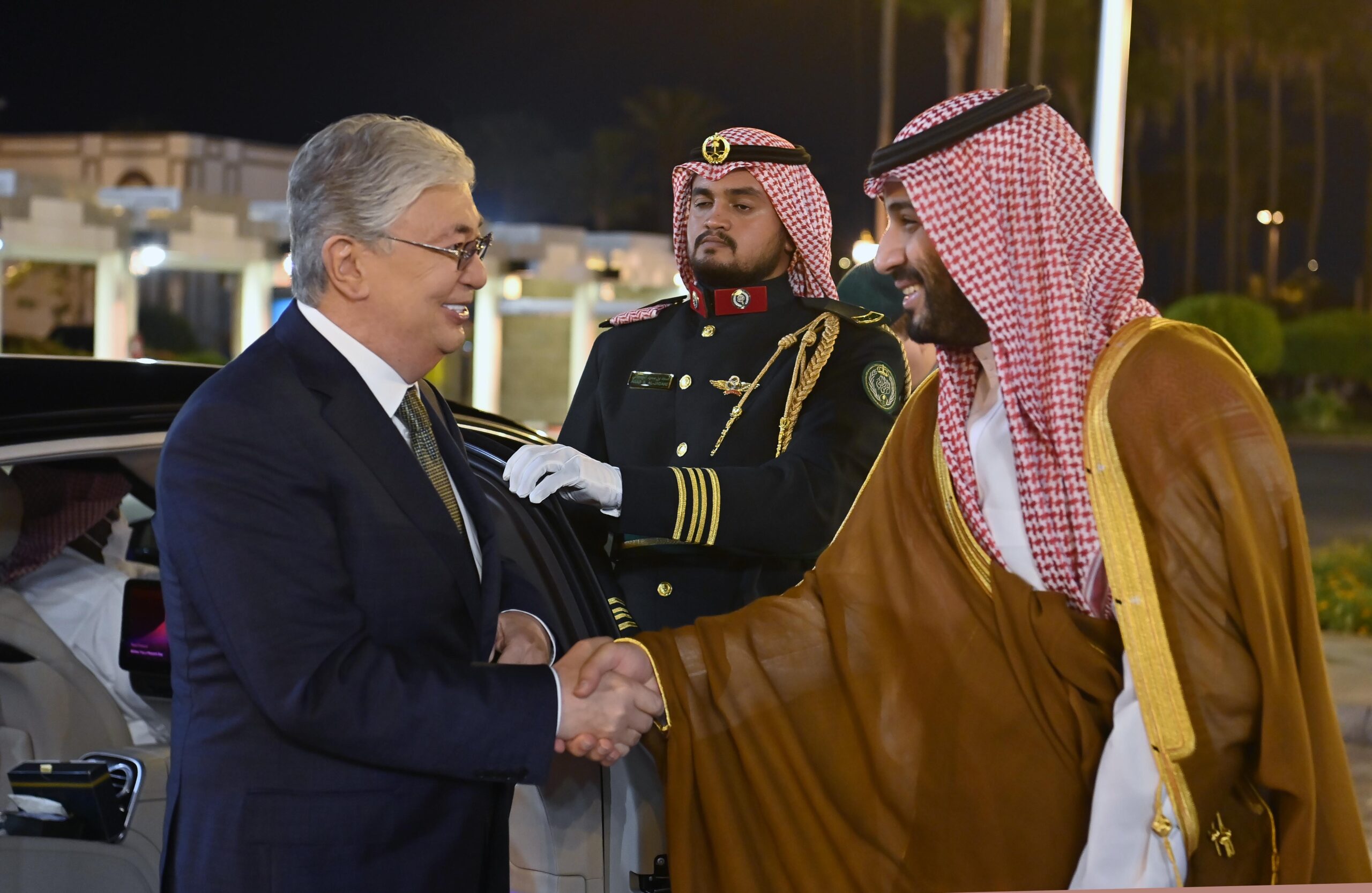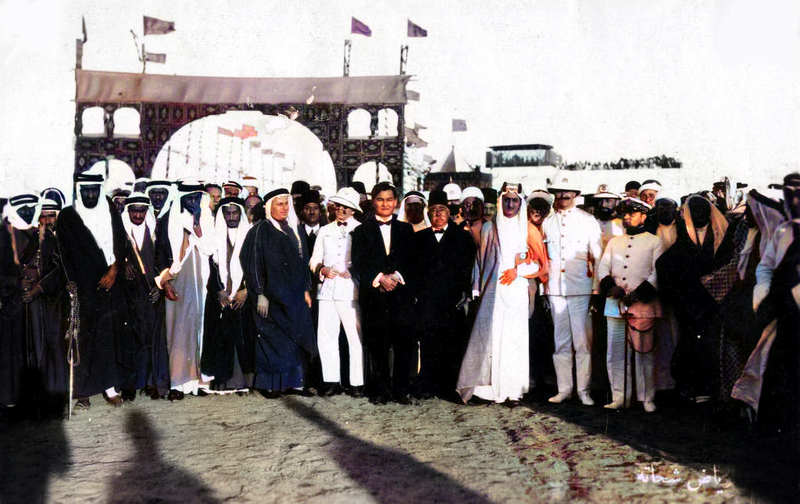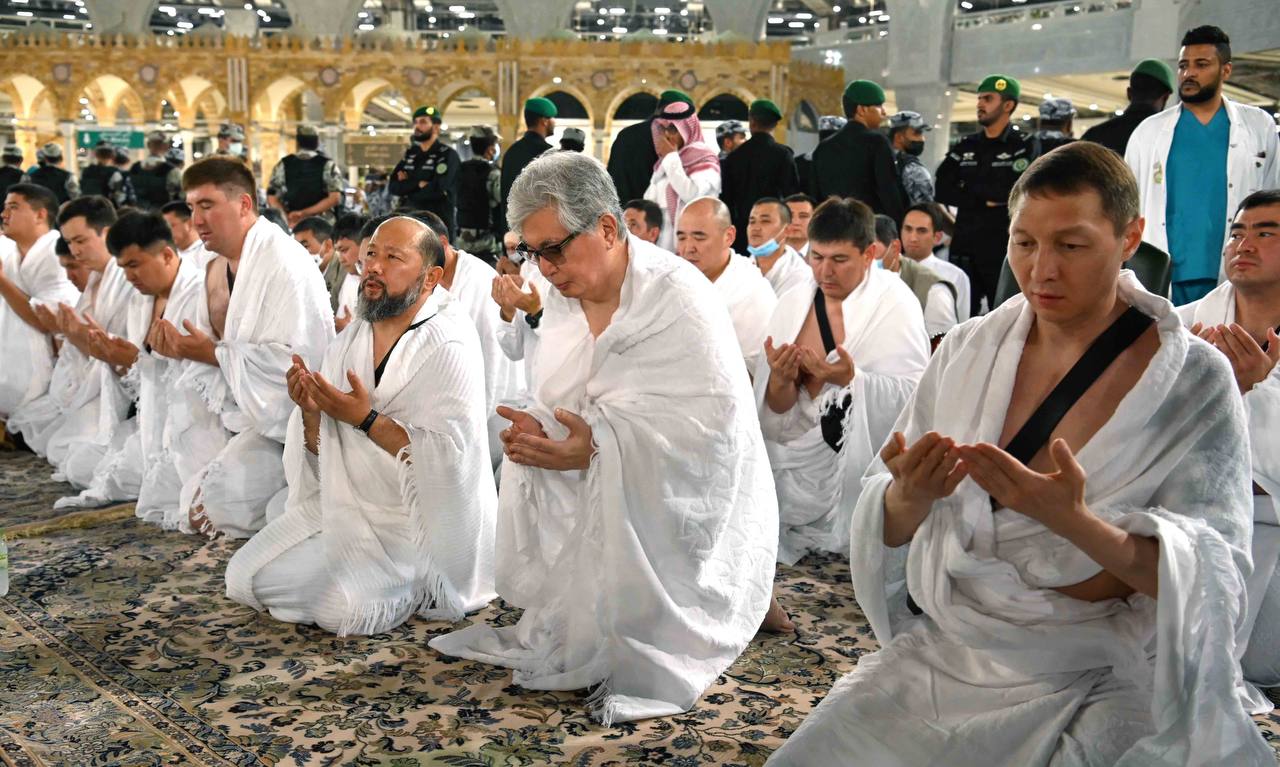NUR-SULTAN – This past weekend, President Kassym-Jomart Tokayev paid an official visit to Saudi Arabia, one of Kazakhstan’s strategic partners. Just a month after Saudi Foreign Minister Faisal bin Farhan Al Saud visited Nur-Sultan, the high-level visit ushered in a new chapter in 30 years of diplomatic relations between Kazakhstan and Saudi Arabia.

President Tokayev and King Salman bin Abdulaziz Al Saud of Saudi Arabian shake hands after Tokayev arrived in Jeddah. Photo credit: Akorda
From the 1930s, when Nazir Torekulov became the first Kazakh diplomat to travel to Saudi Arabia to become Soviet ambassador, to the current time, one fact has become clear – the interest to strengthen ties between the two countries that share much more than economic development prospects is mutual.
The program of Tokayev’s July 23-24 visit was rich, cutting across many areas of bilateral cooperation. Addressing the investment round table on Sunday, he emphasized how similar the two countries look at the future of economic development. This is reflected in Kazakhstan 2050 strategic program and Saudi Arabia’s Saudi Vision-2030.

Assel Satubaldina
While outlining the country’s economic success stories, he said that there is a lot that Saudi companies can benefit from in Kazakhstan. It is Central Asia’s largest economy accounting for 70 percent of total investments in the region and with international reserves of US$90 billion.
“Kazakhstan ranks first globally in tungsten reserves, second in uranium and chromium ore, and in the top 5 in manganese, silver, zinc, and lead. These reserves are waiting for their exploration and development. Given our proximity to the booming Chinese and South Asian markets, this presents a truly excellent investment opportunity. Today we can offer more than 60 deposits of precious and non-ferrous metals for exploration and development,” said Tokayev.
Speaking at the same event, Saudi Arabia’s Investment Minister Khalid al-Falih called Kazakhstan a “vibrant economy.”
“Some of you may know that Saudi Arabia was one of the first nations that recognized Kazakhstan’s independence in 1991. And in three decades, Kazakhstan has become one of the most vibrant economies,” he said. “I want to emphasize that trade between Kazakhstan and Saudi Arabia has grown significantly, especially in the last few years, although there is a lot of room to move forward.”

Born in 1892 in southern Kazakhstan, Nazir Torekulov the first Kazakh diplomat to travel to Saudi Arabia to become an ambassador and the one who was closely involved in building the relations between the two divergent countries – the Kingdom of Saudi Arabia and the Soviet Union. Torekulov’s language skills and close familiarity with Muslim culture enabled him to establish a good reputation and earned him the respect of the King and his family. Photo credit: fnt.kz
Saudi Arabia can offer “ample opportunities” to Kazakhstan, according to Aidar Kurmashev, head of the international and geoeconomic research department at the Kazakh Institute for Strategic Studies.
“Saudi Arabia, as one of the few G20 countries not involved in the current geopolitical confrontation, is the most attractive partner for Kazakhstan,” said Kurmashev. “Its investment potential provides ample opportunities for the practical implementation of Kazakhstan’s economic development plans.”
According to the latest data provided by the Bureau of National Statistics, bilateral trade turnover reached US$3.3 million, with exports – US$2 million and imports – $1.2 million.

On July 24, President Tokayev performed umrah (a lesser pilgrimage) in Mecca, the holiest shrine of Islam. He was honored to enter the Kaaba, its doors are opened for distinguished guests on exceptional occasions. Photo credit: Akorda
“The structure of mutual trade turnover between Kazakhstan and Saudi Arabia is quite diverse. Our country mainly exports ferroalloys and other construction raw materials, while importing various chemical products. Given the ongoing transformation of Kazakhstan’s economy to the production of finished products, as well as the expansion of its export opportunities, the emphasis will obviously be made on this category of goods,” said Kurmashev.
At the roundtable, Tokayev emphasized that the two countries can do more. The analysis conducted by the Kazakh side indicates that Kazakhstan can offer more than 100 processed goods types worth around $400 million a year in machinery, iron and steel production, as well as food processing and agriculture.
Rising opportunities for cooperation in agriculture
The latter has a huge potential considering Kazakhstan’s agricultural abundance. It ranks second in the world in terms of arable land per capita and fifth in terms of pasture resources that reach 180 million hectares.
During the roundtable, the Kazakh Invest national company and the Al Rajhi International for Investment fund signed an agreement on agribusiness investment projects.
Kazakhstan and Saudi Arabia also agreed on providing a supply of dried mare’s milk from Kazakhstan, among other important agreements.
“We are ready to become one of the stable, long-term suppliers of high-quality wheat, flour and oilseeds to the Kingdom of Saudi Arabia,” said Tokayev at the roundtable.
Saudi Arabia has also made significant efforts to develop its agricultural sector. However, the water supply and specifically the lack of water has always been the major constraint on agriculture and the determining factor on cultivation efforts.
Agriculture is absolutely essential to achieving food security, a top priority for countries around the world, including for Kazakhstan and Saudi Arabia. “Ensuring it [food security] requires large territory and favorable climate, which Kazakhstan has. With the necessary investment support, the agriculture and agro-industrial production in Kazakhstan can provide significant results for both domestic and foreign markets,” said Kurmashev.
Financial analyst Nurgali Nurmahambetov said that Kazakhstan is one of the few countries with a significant Muslim population that has the capacity to grow grains and other food products almost on a global scale.
“All we need is a serious investment. And the Arab countries have a full range of investments. They are very good long-term investors. Probably the best in the world. That is why they are present in all major economies, they do not have any obstacles to making large investments because of their high reputation. The key issue for them now is food security,” he said.
Logistics and transport
Saudi Arabia’s experience in logistics and transport might also be helpful for Kazakhstan now that the country is forced to consider alternative transportation routes in light of the current geopolitical landscape.
“Logistics and transport in Kazakhstan also require large investments and assistance. Logistical problems are a special concern for our country today. Almost all goods came from Russia or through Russia. The lack of traditional routes has made all the consumer goods we import more expensive. To improve the situation, we need a lot of money, we need help. And this is where the experience of our Arab friends would come in handy,” he said.
In fact, Tokayev’s visit to Saudi Arabia comes just a month after he visited Qatar to boost bilateral ties.
Thirteen agreements signed at the roundtable
Saudi Arabia and Kazakhstan signed 13 bilateral documents covering such sectors as power, tourism, sports, agricultural products, pharmaceuticals, media and financial services.
The agreements include a memorandum of understanding between the Kazakh Ministry of Culture and Sports and the Saudi Ministry of Sports to develop sports, between the Astana International Exchange and the Saudi Stock Exchange, between the Kazakh Ministry of Information and Social Development and the Saudi Ministry of Mass Media to foster mass media exchanges, and a cooperation agreement between the QazTrade Center for Trade Policy Development and Ajlan & Bros Holding Group, and a protocol of sanitary and technical requirements for the import of cattle and mutton meat, among other documents.
The author is Assel Satubaldina, Senior Editor of The Astana Times

